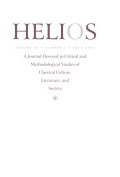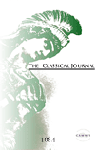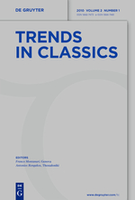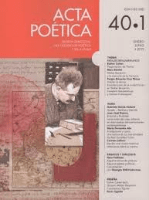
HELIOS
Scope & Guideline
Pioneering Research in Cultural Studies and Linguistics.
Introduction
Aims and Scopes
- Interdisciplinary Literary Analysis:
HELIOS publishes works that critically engage with classical texts using various methodologies, including psychoanalysis, gender studies, and posthumanism. - Focus on Classical Authors:
The journal showcases scholarly discussions centered around significant classical authors like Ovid, Sophocles, and Propertius, examining their works in historical and contemporary contexts. - Cultural and Historical Contextualization:
Papers often contextualize classical works within their historical settings while also drawing connections to modern societal issues, highlighting the relevance of ancient literature today. - Exploration of Gender and Identity:
A consistent focus is placed on themes of gender and identity, particularly through the analysis of characters and narratives that challenge traditional gender roles. - Ecocritical Perspectives:
The journal increasingly incorporates ecocritical approaches, examining the entanglements of the human and nonhuman within classical texts.
Trending and Emerging
- Intersectionality in Classical Studies:
There is a growing trend towards applying intersectional frameworks to classical texts, as seen in discussions around identity, gender, and social constructs, which enriches the understanding of ancient narratives. - Psychoanalytic Approaches:
Psychoanalytical readings of classical characters and themes are increasingly prominent, allowing for a deeper exploration of human psychology and its manifestations in ancient literature. - Contemporary Relevance of Classical Works:
Recent papers highlight the relevance of classical texts in contemporary societal contexts, such as discussions of the #MeToo movement, indicating a significant trend in applying ancient literature to current social issues. - Ecological and Nonhuman Perspectives:
Emerging themes focus on the relationships between humans and nonhumans in classical literature, reflecting a broader ecocritical movement within literary studies that seeks to understand these interconnected narratives.
Declining or Waning
- Traditional Historical Narratives:
Papers that focus solely on historical accounts or traditional interpretations of classical texts are becoming less prevalent, as the journal leans towards more innovative and interdisciplinary analyses. - Purely Textual Exegesis:
There is a noticeable decline in works that engage with texts in isolation without considering broader cultural, psychological, or ecological implications, indicating a shift towards more holistic approaches. - Minimalist Literary Criticism:
The journal has seen fewer contributions that apply minimalist or surface-level literary criticism, suggesting a trend towards deeper analytical frameworks that interrogate underlying themes and contexts.
Similar Journals

Dicenda-Cuadernos de Filologia Hispanica
Fostering Critical Discourse in Linguistics and LiteratureDicenda-Cuadernos de Filologia Hispanica, published by UNIV COMPLUTENSE MADRID, SERVICIO PUBLICACIONES, is a distinguished academic journal in the fields of linguistics, literature, and literary theory. Since its transition to Open Access in 2017, it has facilitated unrestricted dissemination of knowledge, making it an invaluable resource for researchers, scholars, and students interested in the rich tapestry of Hispanic philology. With an impact factor reflected by its Scopus rankings—at Q3 in Linguistics and Language and Q2 in Literature and Literary Theory—Dicenda serves as a vital platform for innovative research and critical discourse. The journal actively encourages submissions that explore contemporary and historical perspectives within its scope. Located in Madrid, Spain, the journal has steadily established itself as a significant contributor to the ongoing dialogue in the humanities, fostering a deeper understanding of linguistic and literary phenomena.

South Asian Review
Celebrating the Vibrancy of South Asian Literary Landscapes.South Asian Review is a distinguished academic journal published by Taylor & Francis Ltd, dedicated to exploring the rich tapestry of cultural, linguistic, and literary landscapes of South Asia. Renowned for its interdisciplinary approach, the journal covers a wide range of topics, making significant contributions to the fields of Cultural Studies, Gender Studies, Linguistics and Language, and Literature and Literary Theory. With a commendable Q1 ranking in Literature and Literary Theory and notable placements in other relevant categories as of 2023, it offers researchers, scholars, and students a platform to share critical insights and foster dialogue within these dynamic fields. Although it operates under traditional subscription models rather than open access, South Asian Review remains a vital resource for those seeking to understand and engage with the complexities of South Asian contexts and identities. Its commitment to scholarly excellence is reflected in its impact on contemporary academic conversations, making it an essential read for anyone interested in the nuances of South Asian studies.

Revue Italienne d'Etudes Francaises
Navigating the Intersection of Language, History, and TheoryRevue Italienne d'Etudes Francaises, published by SEMINARIO FILOLOGIA FRANCESE, is a pivotal open access journal dedicated to the exploration and analysis of French studies within the broader context of history, linguistics, and literary theory. Since its inception in 2011, this journal has fostered scholarly dialogue and critical discourse, offering a platform for researchers, professionals, and students alike to disseminate their work and engage with contemporary issues in these fields. With an ISSN and E-ISSN of 2240-7456, the journal has established itself within the academic community, although it currently ranks in the lower quartiles across various disciplines, as indicated by its Scopus metrics. Nevertheless, the Revue Italienne d'Etudes Francaises remains an essential resource for those seeking to deepen their understanding of Francophone literature, culture, and linguistic dynamics from its base in Rome, Italy, at C/O Fondazione Primoli. As the field of French studies continues to evolve, this journal plays an important role in highlighting the latest research findings and theoretical advancements.

Acta Classica
Exploring the Rich Tapestry of Ancient CivilizationsActa Classica is a distinguished journal dedicated to the field of Classics, published by the Department of English in Classical Languages at the University of Free State, South Africa. With its ISSN 0065-1141 and E-ISSN 2227-538X, this journal has been a pivotal platform for scholarly discourse since its inception in 1973, notably converging and evolving significantly in its content from 2010 to 2023. Although it currently holds a Q4 classification in Classics, its Scopus ranking at #88 out of 170 in the Arts and Humanities reflects its relevance in academic circles, with a 47th percentile standing. The journal aims to publish high-quality research articles, reviews, and critical essays that not only explore the rich tapestry of ancient civilizations but also contribute to contemporary understandings of classical languages and literature. While its content is not openly accessible, Acta Classica remains an essential resource for researchers, professionals, and students who seek to deepen their knowledge and engagement with Classical studies.

CLASSICAL JOURNAL
Elevating the Discourse on Classical HeritageCLASSICAL JOURNAL, published by the esteemed Johns Hopkins University Press, stands as a premier academic platform dedicated to the exploration and analysis of classical studies, focusing on ancient Greek and Roman literature, history, and culture. With an impressive impact factor and categorized in the Q1 quartile for Classics in 2023, the journal provides high-quality, peer-reviewed articles that contribute significantly to our understanding of classical antiquity. Researchers and students from around the globe turn to CLASSICAL JOURNAL for groundbreaking insights, as it consistently ranks in the top tier of its field, occupying rank #52 in the Scopus listings within the Arts and Humanities sector, placing it in the 69th percentile. While the journal maintains a traditional subscription model, its rich content and scholarly relevance make it an essential resource for anyone engaged in the study of the classical world, enhancing the academic discourse surrounding this timeless and influential area of study.

Trends in Classics
Elevating classical discourse for a modern audience.Trends in Classics is a distinguished academic journal published by WALTER DE GRUYTER GMBH, dedicated to advancing the field of Classics through critical scholarship and innovative research. With an ISSN of 1866-7473 and an E-ISSN of 1866-7481, this journal offers a platform for scholars from around the globe to share insights on classical literature, history, and archaeology. Indexed in Scopus and awarded a respectable Q4 classification in Classics, it ranks 48th out of 170 in the Arts and Humanities category, placing it in the top 72nd percentile—an indicator of its growing influence and contribution to the field. Operating from Germany, specifically from Genthin Strasse 13, D-10785 Berlin, the journal spans converged years from 2009 to 2024, fostering ongoing dialogues and developments within classical studies. Although it does not currently offer open access, its commitment to scholarly excellence makes it a vital resource for researchers, professionals, and students alike, who seek to deepen their understanding of ancient cultures and their lasting impacts on contemporary society.

Synthesis-La Plata
Advancing scholarly discourse in the Humanities.Synthesis-La Plata is an esteemed academic journal published by UNIV NAC LA PLATA, FAC HUMANIDADES & CIENCIAS EDUC, focusing on the fields of Arts, Humanities, and Social Sciences, with a particular emphasis on Literature, Literary Theory, and Linguistics. Since its inception in 2009, this Open Access journal has been dedicated to providing a platform for scholarly discourse and innovative research, allowing unrestricted access to a multitude of international studies. Although it experienced a hiatus in its Scopus coverage between 2012 and 2014, the journal continues to foster critical analysis and promotes interdisciplinary approaches within its domains. With an ISSN of 0328-1205 and an E-ISSN of 1851-779X, Synthesis-La Plata aims to reach a diverse readership, including researchers, educators, and students who seek to deepen their understanding of literary and linguistic dynamics. Despite its recent Scopus rankings indicating low percentiles, the journal remains a significant resource for scholarly inquiry in the humanities."

Acta Poetica
Advancing Cultural Insights through Scholarly DialogueActa Poetica is a distinguished open-access journal dedicated to advancing research and scholarship in the fields of Cultural Studies and Literature and Literary Theory. Published by the Universidad Nacional Autónoma de México through its Instituto de Investigaciones Filológicas, this journal has been a pivotal platform for the dissemination of literary discourse since it embraced open access in 1979. With a notable presence in both the social sciences and humanities, Acta Poetica has earned a ranking of Q3 and Q2 in the 2023 category quartiles, reflecting its commitment to quality scholarship. The journal invites contributions from researchers, professionals, and students alike, fostering a rich dialogue that explores the nuances of literary criticism and cultural phenomena. With its ISSN 0185-3082 and E-ISSN 2448-735X, the journal aims to make valuable research accessible to a global audience, continuing its legacy of enhancing literary scholarship from its base in Mexico City.

QUADERNI URBINATI DI CULTURA CLASSICA
Advancing Scholarly Dialogue in Classical StudiesQUADERNI URBINATI DI CULTURA CLASSICA is a distinguished academic journal dedicated to the interdisciplinary exploration of Classics, Linguistics, and Literary Theory. Published by ACCADEMIA EDITORIALE PISA-ROMA, this journal serves as a vital scholarly platform for researchers and professionals alike, facilitating in-depth discussions and analyses that contribute to these evolving fields. With an ISSN of 0033-4987 and an E-ISSN of 1724-1901, it boasts a robust Scopus ranking, placing it within the second quartile in Classics and the third quartile in related disciplines as of 2023. Although it is not an open-access journal, QUADERNI URBINATI DI CULTURA CLASSICA remains essential for those engaged in the study of language, literature, and classical cultures, encouraging scholarly exchange and innovation from its base in Rome, Italy. Researchers and students will find valuable insights and methodologies within its pages, making it a key resource for fostering academic growth and understanding.

Exemplaria Classica
Unraveling the Rich Tapestry of Ancient TextsExemplaria Classica, published by Universidad de Huelva's Servicio de Publicaciones, is a prominent academic journal dedicated to the fields of Classics and Literature and Literary Theory. Established in 2011, this journal serves as a vital resource for scholars, educators, and students interested in the rich tapestry of classical literature and its enduring influence on contemporary thought. With an ISSN of 1699-3225 and an E-ISSN of 2173-6839, it has firmly established itself in the academic community, although it currently holds a Q4 ranking in both its categories. The journal is ranked #712 out of 1106 in Literature and Literary Theory and #129 out of 170 in Classics as per Scopus rankings, reflecting its emerging status in these fields. Despite its open access designation being currently unclear, Exemplaria Classica is essential for advancing discussions and research in classical studies and has covered a diverse range of topics over its publishing years, making it an important addition to any academic library.